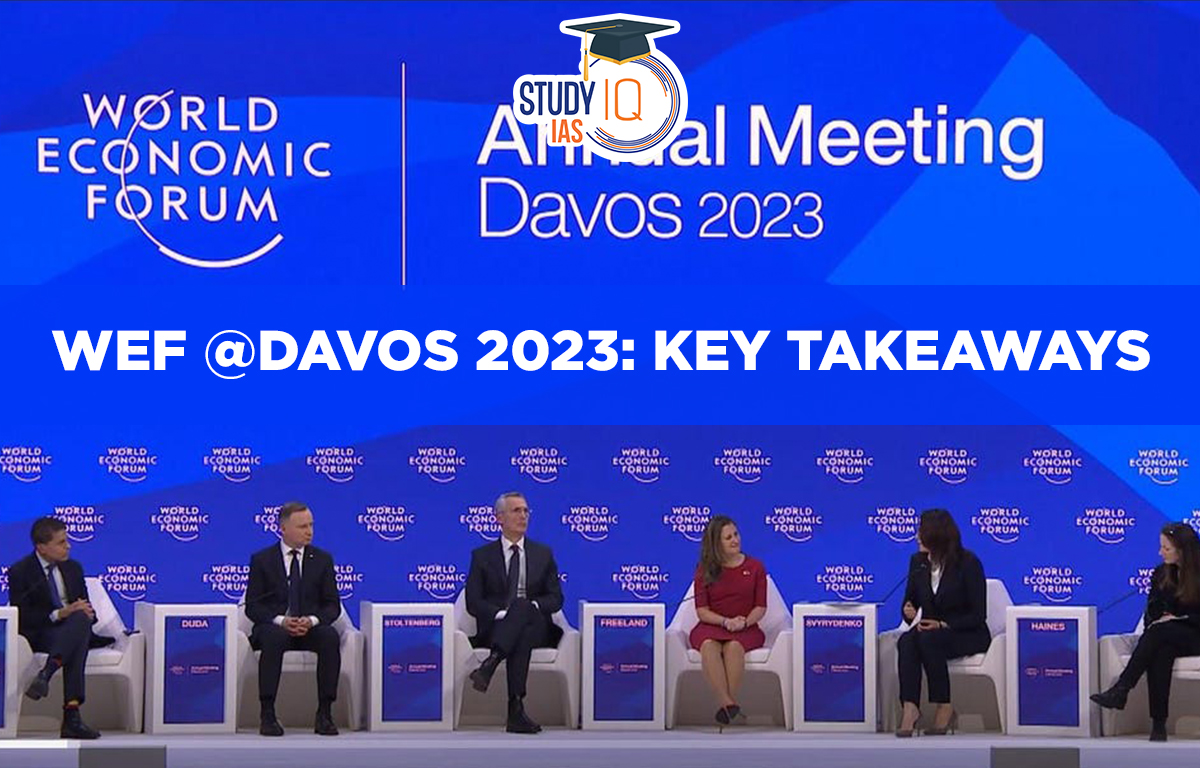Table of Contents
Context: World Economic Forum’s Annual Meeting 2023 took place in Davos.
About World Economic Forum (WEF)
- It was founded in 1971 by Klaus Schwab, a Swiss-German economist and professor.
- It is a not-for-profit foundation meant to foster global cooperation on political, social, and economic issues.
- This year’s conference with the theme of ‘Cooperation for Sustainable Growth and Shared Prosperity’ will see more than 2,700 leaders from 130 countries, including 52 heads of state and government.
Key takeaways from WEF Davos 2023
| On Economy | Cautious Optimism: The US and Europe seem beyond the risk of recession.
Most economies are coming out of the covid-triggered slowdown. Business leaders have put a positive display and projections about the developing scenario Concern: Inflationary pressures from China’s reopening and rising debt distress in the developing world. High interest rate charged by central banks to ensure inflation is under check. |
| Financial Services: | Global financial institutions are grappling with how to right-size for a slowdown
Pressure increasing on financial institutions to finance the global transition to a greener future much faster than they have been doing so far. |
| Inflation Reduction Act: | EU has shown concern over the act, as it would mobilize state aid and a sovereignty fund to keep firms from moving to the United States.
Inflation Reduction Act is aimed to make historic investments in the USA social safety net. It makes the largest investment in combating climate change in U.S. history, lowers the cost of prescription drugs and raises taxes on corporations. |
| On Trade | Caution on friendshoring was highlighted at the meeting.
Friendshoring is a strategy where a country sources the raw materials, components and even manufactured goods from countries that share its values. The dependence on the countries considered a “threat” to the stability of the supply chains has slowly reduced. |
| Climate Change | Giving to Amplify Earth Action (GAEA) was launched.
It is a global initiative to fund and grow new and existing public, private and philanthropic partnerships (PPPPs) to help unlock the $3 trillion of financing needed each year to reach net zero, reverse nature loss and restore biodiversity by 2050. It is time for richer countries and corporates to put in more money to fight climate change. EU raised concerns over a US green energy law that benefits products, such as electric vehicles, made in America. |
| On Ukraine | Ukraine kept up its demand for more military aid to fight its war against Russia, and more financial aid to rebuild after the war
Concern: Fears of an economic downturn highlighted global divisions as some delegates encouraged a quick return to the negotiating table. |
| On Technology | With increasing automation, companies are announcing tens of thousands of employee’s layoffs globally. |
| On China | China declared itself open for business
It was broadly welcomed but also raised inflationary fears and left people waiting to see what this would mean for existing tensions with the United States. |
| On India | World Economic Forum’s Founder and Executive Chairman Klaus Schwab said India is a bright spot amid the global crisis.
India is promoting a just and equitable growth for all in the world during its G20 presidency. It is making significant progress on the most pressing domestic challenges. |


 Gutti Koya Tribals in Post-Conflict Indi...
Gutti Koya Tribals in Post-Conflict Indi...
 Civil Services Day 2025, Date, History, ...
Civil Services Day 2025, Date, History, ...
 GPSC Syllabus, Download Prelims and Main...
GPSC Syllabus, Download Prelims and Main...





















